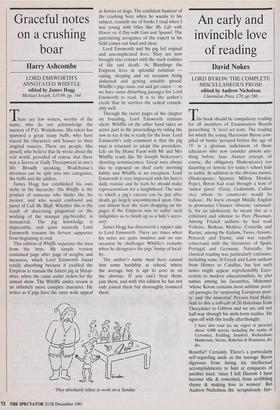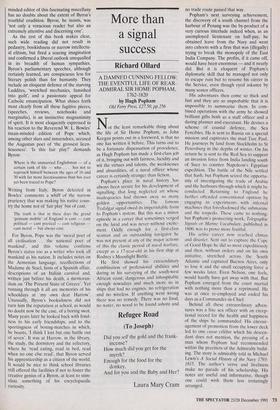An early and invincible love of reading
David Nokes
LORD BYRON: THE COMPLETE MISCELLANEOUS PROSE edited by Andrew Nicholson Clarendon Press, £70, pp.580 This book should be compulsory reading for all members of Examination Boards prescribing 'A' level set texts. The reading list which the young Harrovian Byron com- piled of books 'perused before the age of 15' is a glorious indictment of those educators who now consider almost any- thing before Jane Austen (except, of course, the obligatory Shakespeare) too daunting or remote for today's school kids to tackle. In addition to the obvious names, (Shakespeare, Spenser, Milton, Dryden, Pope), Byron had read through a host of `minor poets' (Gray, Goldsmith, Collins etc), whom 'to enumerate would he tedious'. He knew enough Middle English to pronounce Chaucer 'obscene' (unusual- ly, for an adolescent, he meant this as a criticism) and inferior to Piers Plowman. Among French authors he had read Voltaire, Boileau, Moliere, Corneille and Racine; among the Italians, Tasso, Ariosto, Petrarch and Dante, and was equally conversant with the literatures of Spain, Portugal and Germany. Naturally, his classical reading was particularly extensive, including some 30 Greek and Latin authors from Homer to Catullus; but lest such tastes might appear reprehensibly Euro- centric to modern educationalists, he also names among his favourites, Mahomet `whose Koran contains most sublime poeti- cal passages far surpassing European poet- ry' and 'the immortal' Persian bard Hafiz. Add to this a roll-call of 20 historians from Thucydides to Gibbon and we are still not half-way through his sixth-form studies. He signs off with this lordly afterthought: I have also read (to my regret at present) above 4,000 novels, including the works of Cervantes, Fielding, . Smollett, Richardson, Mackenzie, Sterne, Rabelais & Rousseau, &c &c.
Boastful? Certainly. There's a particularly self-regarding aside as the teenage Byron digresses from listing his intellectual accomplishments to hint at. conquests of another kind: 'since I left Harrow I have become idle & conceited, from scribbling rhyme & making love to women'. But Andrew Nicholson, the scrupulously fair-
minded editor of this fascinating miscellany has no doubts about the extent of Byron's youthful erudition. Byron, he insists, was `not only a voracious reader but also an extremely attentive and discerning one'.
As the rest of this book makes clear, such wide reading did not result in pedantry, bookishness or narrow intellectu- al elitism, but fired a soaring imagination and confirmed a liberal outlook unequalled in its breadth of human sympathies. Byron's parliamentary speeches, although certainly learned, are conspicuous less for literary polish than for humanity. They include an eloquent defence of the starving Luddites, 'wretched mechanics, famished into guilt', and a passionate appeal for Catholic emancipation. What shines forth most clearly from all these fugitive pieces, (speeches, reviews, notebooks and marginalia), is an instinctive magnanimity of spirit. It is most eloquently expressed in his reaction to the Reverend W. L. Bowles' mean-minded edition of Pope which, among other slurs and innuendoes, accused the Augustan poet of 'the grossest licen- tiousness'. 'Is this fair play?' demands Byron:
Where is the unmarried Englishman — of a certain rank of life — who . . has not to reproach himself between the ages of and 30 with far more licentiousness than has ever yet been traced to Pope?
Writing from Italy, Byron detected in Bowles' comments a whiff of the narrow pruriency that was making his native coun- try the home not of 'fair play' but of cant.
The truth is that in these days the grand `primum mobile' of England is cant — cant political — cant poetical — cant religious cant moral — but always cant.
For Byron, Pope was the 'moral poet of all civilisation . . . the national poet of mankind', and this volume confirms Byron's status too as a writer who took all mankind as his nation. It includes notes on the Armenian language, recollections of Madame de Stael, hints of a Spanish affair, descriptions of an Italian carnival and. written just before his death, a memoran- dum on 'The Present State of Greece'. Yet running through it all are memories of his schooldays at 'my own dear Harrow'. Unusually, Byron's bookishness did not earn him the reputation at school, as would no doubt now be the case, of a boring swot. Many years later he looked back with fond- ness to his early friendships, and to the sportingness of boxing-matches in which, he boasts, 'I think I lost but one battle out of seven'. It was at Harrow, in the library, the study, the dormitory and the refectory, where he 'read eating, read in bed, read When no one else read', that Byron served his apprenticeship as a citizen of the world. It would be nice to think school libraries still offered the facilities if not to foster the creative genius of a Byron, at least to stim- ulate something of his encyclopaedic curiosity.











































































































 Previous page
Previous page